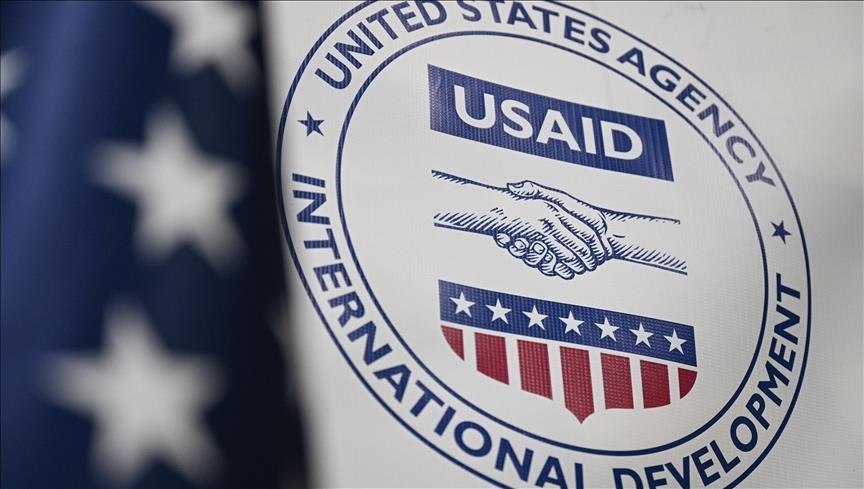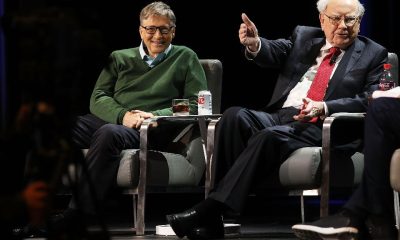Investigations
USAID Disbursed KES 84.1 Billion to Over 230 Institutions in Kenya for Fiscal Year 2024: Here’s The Full List Of Beneficiaries

In the wake of USAID funding freeze following President Donald Trump’s order, a lot continues to come to surface including allegations that the funds were misused to champion for other agendas that didn’t prioritize the America’s interests.
It has also been revealed that the kitty funded projects in Kenya to the tune of billions.
The United States Agency for International Development (USAID) disbursed a total of KES 84.1 billion to more than 230 institutions for various activities in the country during the Fiscal Year 2024. This funding were aimed at addressing critical areas such as health, education, agriculture, and governance.
Key Beneficiaries and Allocations
The largest recipient of USAID funding in Kenya is the World Food Program (WFP), received KES 15.6 billion. Other major beneficiaries include private enterprises in the US, which received KES 8.3 billion, though specific details about these entities remain redacted in compliance with the Foreign Aid Transparency and Accountability Act of 2016.
Significant funding was also allocated to organizations such as the Agriculture Cooperative Development International (KES 5 billion), Catholic Relief Services (KES 2.7 billion), and Development Alternatives (KES 2.5 billion).
Diverse Range of Recipients
The disbursements cover a wide array of institutions, including universities, non-governmental organizations (NGOs), and international bodies. For instance, Moi Teaching & Referral Hospital received KES 2 billion, while the University of Nairobi was allocated KES 1.2 billion. International organizations like the United Nations Children’s Fund (UNICEF) and the World Health Organization (WHO) also received significant funding, with KES 1.6 billion and KES 160 million, respectively.
Support for Local and International NGOs
Local NGOs and international organizations working in Kenya also benefited from the funding. The Kenya Red Cross Society received KES 1.1 billion, while international NGOs such as Mercy Corps and Amref Health Africa were allocated KES 1.4 billion and KES 1.5 billion, respectively.
—Enterprises – US Redacted: Sh8.3 billion
—Catholic Relief Services: Sh2.7 billion
—Development Alternatives: Sh2.5 billion
—World Vision: Sh2.3 billion
—PATH: Sh2.2 billion
—Liverpool VCT, Care and Treatment: Sh2.1 billion
—Moi Teaching & Referral Hospital: Sh2 billion
—United Nations Children Fund: Sh1.6 billion
—Abt Associates: Sh1.6 billion
—Amref Health Africa: Sh1.5 billion
—Mercy Corps: Sh1.4 billion
—University of Nairobi: Sh1.2 billion
—Centre for Health Solutions – Kenya: Sh1.2 billion
—University System of Maryland: Sh1.2 billion
—Concern Worldwide: Sh1.2 billion
—Kenya Red Cross Society: Sh1.1 billion
—Liberty Maritime Corporation: Sh1.2 Billion
—NGO International – Redacted: Sh991 Million
—RTI International: Sh898 Million
—US Government – Dept. of State: Sh886 Million
—Save the Children: Sh851 Million
—ACF International: Sh767 Million
—Mission for Essential Drugs and Supplies: Sh751 Million
—Enterprise – Non US Redacted: Sh710 Million
—Education Development Centre: Sh671 Million
—Ananda Marga Universal Relief Team: Sh668 Million
—International Rescue Committee: Sh643 Million
—Christian Health Association of Kenya: Sh639 Million
—Socha: Sh620 Million
—Government of Kenya: Sh602 Million
—Futures Group Global: Sh598 Million
—Moi University: Sh589 Million
—Chemonics International: Sh513 Million
—Jaramogi Oginga Odinga University of Science and Technology: Sh461 Million
—U.S. Government – Department of Health & Human Services: Sh456 Million
—Tetra Tech: Sh413 Million
—Kenyatta University: Sh395 Million
—Strathmore University: Sh384 Million
—[Redacted] U.S. NGO: Sh374 Million
—Northern Rangelands Trust: Sh363 Million
—Wajir South Development Association: Sh363 Million
—A.P. Moller-Maersk Group: Sh336 Million
—JSI Research & Training Institute, Inc.: Sh320 Million
—SightSavers: Sh291 Million
—Amentum: Sh281 Million
—Kenya Conference of Catholic Bishops: Sh280 Million
—[Redacted] U.S. University/Research Institute: Sh278 Million
—Consortium for Elections and Political Processes: Sh271 Million
—German Government – GIZ: Sh254 Million
—[Redacted] Non-U.S. Enterprise: Sh247 Million
—St. John’s Community Centre: Sh218 Million
—National Council of Churches: Sh213 Million
—Kenya Community Development Foundation: Sh210 Million
—Cargill, Inc.: Sh209 Million
—Millennium Water Alliance: Sh205 Million
—Population Services Kenya: Sh194 Million
—Act Change Transform: Sh173 Million
—International Fund for Animal Welfare, Inc.: Sh172 Million
—International Organisation for Migration: Sh169 Million
—World Health Organisation: Sh160 Million
—Kenya Medical Training College: Sh153 Million
—Mkomani Clinic Society: Sh152 Million
—American Institutes for Research: Sh138 Million
—Boston Consulting Group, Inc.: Sh133 Million
—Unspecified Vendors – Kenya: Sh132 Million
—International Federation of Red Cross and Red Crescent: Sh129 Million
—Grant Thornton: Sh128 Million
—U.S. Government – Peace Corps: Sh123 Million
—Food and Agriculture Organisation: Sh113 Million
—Institute of Economic Affairs: Sh113 Million
—ICF International: Sh113 Million
—U.S. Government – Department of Agriculture: Sh110 Million
—Transparency International: Sh104 Million
—Lutheran World Federation: Sh98 Million
—Hebrew Immigrant Aid Society: Sh95 Million
—Warrior Insight: Sh92 Million
—Medical Benevolence Foundation: Sh91 Million
—Crisis Response Company: Sh89 Million
—Kenya Wildlife Conservancies: Sh88 Million
—U.S. Government – Department of Interior: Sh87 Million
—ISAAA Global Knowledge Center: Sh78 Million
—Capsule: Sh75 Million
—Palladium Group: Sh73 Million
—Sincerus Global Solutions: Sh72 Million
—Integra, LLC: Sh67 Million
—U.S. Government – Department of Justice: Sh59 million
—Cezam and Associates Limited: Sh55 million
—Electoral Law and Governance Institute for Africa: Sh50 million
—Imperial Managed Solutions: Sh50 million
—International Labour Organisation: Sh49 million
—Constellis: Sh48 million
—Nationwide Supplies: Sh46 million
—Chapel Hill: Sh43 million
—Centre for International Forestry Research: Sh39 million
—CURE International: Sh36 million
—Terre des Hommes-International Federation: Sh36 million
—Makwa Global: Sh35 million
—Search for Common Ground: Sh34 million
—WMDTech: Sh33 million
—Cherokee Nation Businesses: Sh33 million
—University of California, San Francisco: Sh33 million
—DT Global: Sh31 million
—Health Strat Limited: Sh30 million
—International Maize and Wheat Improvement: Sh30 million
—Centre for Rights Education and Awareness: Sh28 million
—LINC, LLC: Sh27 million
—Amethyst Technologies: Sh27 million
—Africa One Health University Network: Sh26 million
—The Global Health Assurance Partnership: Sh26 million
—RefuSHE: Sh26 million
—Inkomoko: Sh24 million
—Mediae Company: Sh24 million
—Sustainable Interventions for Development: Sh24 million
—World Renew: Sh24 million
—IMA World Health: Sh22 million
—EnCompass: Sh22 million
—United States International University – Africa: Sh19 million
—Global Integrity: Sh18 million
—Genesis Analytics: Sh18 million
—Delphos International Ltd.: Sh18 million
—Public International Law and Policy Group: Sh14 million
—Mwen Rice Growers Multipurpose Cooperative: Sh14 million
—Nuru Nigeria Development Initiative Limited: Sh13 million
—Women Fighting AIDS in Kenya: Sh13 million
—Windle International: Sh13 million
—Camdus Group, The: Sh13 million
—U.S. Government – Department of Energy: Sh12 million
—PricewaterhouseCoopers: Sh11 million
—ZLC Solutions: Sh10 million
Multilateral – UN Organization Redacted: Sh10 million
—Invitational Travelers – USAID: Sh9 million
—Technoserve: Sh9 million
—F&D Federal LLC: Sh9 million
—Megawatt Power and —Telecommunication: Sh8 million
—Lake Region Community Development Program: Sh8 million
—Lake Region Community Development Initiative: Sh8 million
—U.S. Government – Millennium Challenge Corporation: Sh8 million
—Ishtar MSM: Sh7 million
—Sovana Global Logistics: Sh7 million
—Winrock International: Sh7 million
—Ganiam Limited: Sh6.5 million
—Jefferson Consulting Group: Sh5.3 million
—Global Organic Chicken Ltd: Sh5 million
—Exotic EPZ Limited: Sh4.8 million
—Online Harms Foundation: Sh4.8 million
—Children of God Relief Institute: Sh4.6 million
—USTADI Foundation: Sh4.3 million
—Ol Pejeta Conservancy: Sh4.1 million
—Negus Med Limited: Sh3.3 million
—Seed Delight Limited: Sh3.3 million
—Kismani Health Care Services: Sh3.3 million
—Comrade Dairy and Food Enterprises: Sh3.3 million
—Maasai Mara Wildlife Conservancies Association: Sh3.2 million
—Business Council for International Understanding: Sh3.1 million
—Banyan Global: Sh3 million
The recent decision by the U.S. administration to drastically reduce USAID funding is poised to have significant repercussions for Kenya. USAID, which has historically been a key supporter of health, education, and economic development initiatives in the country, is now under scrutiny with President Trump’s administration aiming to streamline foreign aid spending.
The cuts, which are part of a broader effort to merge USAID with the State Department under Secretary Rubio’s oversight, have led to immediate concerns over ongoing projects. Programs that have been pivotal in combating HIV/AIDS, malaria, and tuberculosis, as well as those supporting newborn health, are among the first to feel the strain.
The cessation of USAID funding could disrupt the supply of essential medications and medical supplies, affecting millions of Kenyans.
Local health officials have expressed alarm, with some indicating they will seek alternative funding sources to mitigate the impact. However, the sudden withdrawal of such significant financial support poses a challenge, especially at a time when Kenya is striving to enhance its healthcare infrastructure.
The economic sector is also expected to suffer, with programs aimed at poverty alleviation and economic empowerment at risk. Development projects that were reliant on USAID grants might see delays or cancellations, potentially stunting growth in various communities across Kenya.
Critics of the funding cuts argue that they could lead to long-term negative impacts, not only in terms of health but also in education and general welfare, potentially reversing years of progress.
Others suggest that this might be an opportunity for Kenya to reduce dependency on foreign aid and seek more sustainable local solutions or partnerships with other international donors.
Kenya Insights allows guest blogging, if you want to be published on Kenya’s most authoritative and accurate blog, have an expose, news TIPS, story angles, human interest stories, drop us an email on [email protected] or via Telegram
-

 Grapevine2 weeks ago
Grapevine2 weeks agoRussian Man’s Secret Sex Recordings Ignite Fury as Questions Mount Over Consent and Easy Pick-Ups in Nairobi
-

 News7 days ago
News7 days agoTHE FIRM IN THE DOCK: How Kaplan and Stratton Became the Most Scrutinised Law Firm in Kenya
-

 Investigations1 week ago
Investigations1 week agoMulti-Million Dollar Fraud: Three Kenyans Face US Extradition in Massive Cybercrime Conspiracy
-

 Economy1 week ago
Economy1 week agoIran Demands Arrest, Prosecution Of Kenya’s Cup of Joe Director Director Over Sh2.6 Billion Tea Fraud
-

 Business1 week ago
Business1 week agoA Farm in Kenya’s Rift Valley Ignites a National Reckoning With Israeli Investment
-

 Africa2 weeks ago
Africa2 weeks agoFBI Investigates Congresswoman Ilhan Omar’s Husband’s Sh3.8 Billion Businesses in Kenya, Somalia and Dubai
-

 Grapevine3 days ago
Grapevine3 days agoA UN Director Based in Nairobi Was Deep in an Intimate Friendship With Epstein — He Even Sent Her a Sex Toy
-

 Politics2 weeks ago
Politics2 weeks agoSifuna, Babu Owino Are Uhuru’s Project, Orengo Is Opportunist, Inconsequential in Kenyan Politics, Miguna Says




















